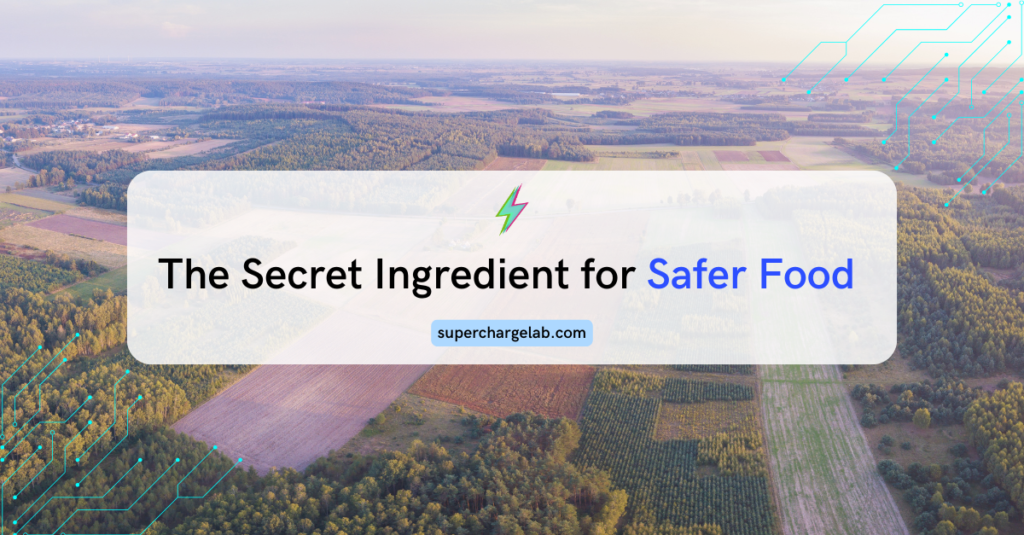
Have you ever thought about how the food on your plate goes from being a seed in the ground or an animal on a farm to a delicious meal? It’s a complex journey, and along the way, there are many opportunities for things to go wrong. That’s where artificial intelligence (AI) comes in. AI, the same technology behind self-driving cars and chatbots, is quietly revolutionizing how we ensure our food is safe and nutritious.
- A Growing Concern in an Increasingly Complex World
In today’s world, where food comes from all corners of the globe, it often travels long distances before ending up on our plates. This journey involves lots of different people and places – farmers, factories, trucks, and stores – and at each step, there’s a chance something could go wrong. Food could get contaminated, spoil, or even be labeled incorrectly. We’ve all heard about outbreaks of food poisoning, reminding us how important it is to keep our food safe.
The usual ways of checking food safety, like inspections and tests, are good, but they can’t catch everything. They’re often more about fixing problems after they happen, and they can’t always check every single piece of food. AI is different. It uses data and smart technology to find potential problems before they make people sick, making our food safer from the start.
- Traceability: Following Food’s Digital Footprints with AI
Traceability is the key to ensuring food safety. It means knowing exactly where your food came from, how it was handled, and where it’s been. In the past, traceability relied on paper records and manual tracking, which were often slow and unreliable. AI is changing that by creating a digital “passport” for each food item.
For example is a carton of eggs. With AI-powered traceability, each egg could have a unique identifier linked to a database containing information about the hen that laid it, the farm where it was raised, the processing plant it passed through, and the truck that delivered it to your local store. This information is collected and stored using technologies like blockchain, which creates a tamper-proof record that can be accessed by everyone in the supply chain.
If a problem arises, such as an outbreak of salmonella linked to eggs, AI can quickly trace the contaminated eggs back to their source. This allows for swift recalls, preventing further illness and protecting consumers. It also helps identify and address underlying issues in the supply chain, making our food safer in the long run.
- AI as Safety Inspector of Our Food
AI is like having a tireless food safety inspector on duty 24/7. It can analyze vast amounts of data from sensors, cameras, and other devices to detect subtle signs of trouble. For example, sensors in storage facilities can monitor temperature and humidity, alerting workers if conditions deviate from the ideal range for food safety.
AI-powered cameras can inspect food products for defects, such as bruises on fruits or discoloration in meat, much faster and more accurately than human inspectors. This ensures that only high-quality products make it to market. AI can even detect contaminants invisible to the naked eye, like harmful bacteria or pesticides, by analyzing chemical signatures or spectral data.
- AI in Agriculture is A Helping Hand for Farmers
AI also empowering farmers to produce more food with fewer resources. AI-powered drones can survey fields, identifying areas where crops are struggling due to pests, disease, or lack of water. This allows farmers to apply pesticides or fertilizers only where they’re needed, reducing costs and minimizing environmental impact.
Beside that AI can also help farmers make better decisions about planting, harvesting, and irrigation. This technology relies on capability to analyzing weather patterns, soil conditions, and historical crop data. AI algorithms can predict optimal planting times, estimate yields, and even suggest the best time to harvest. This can help farmers maximize their profits while reducing waste and conserving resources.
5.Challenges and Opportunities
We agree AgriTech holds immense promise for food safety and agriculture, but there are still challenges to overcome. The high cost of AI-powered technologies can be a barrier for small farmers, and data privacy concerns need to be addressed to ensure that sensitive information is protected. Additionally, the integration of AI into existing food systems requires collaboration between governments, industry stakeholders, and technology providers.
Despite these challenges, AI technology continues to advance. We can expect to see even more innovative applications, from robots that pick fruits and vegetables to personalized nutrition recommendations based on your genetic profile. AI has the potential to revolutionize the entire food system, from farm to fork, making our food safer, healthier, and more sustainable.
If your company ready to transform your agri-food business, contact us today. Let’s work together to build more sustainable food system. https://calendly.com/superchargelab